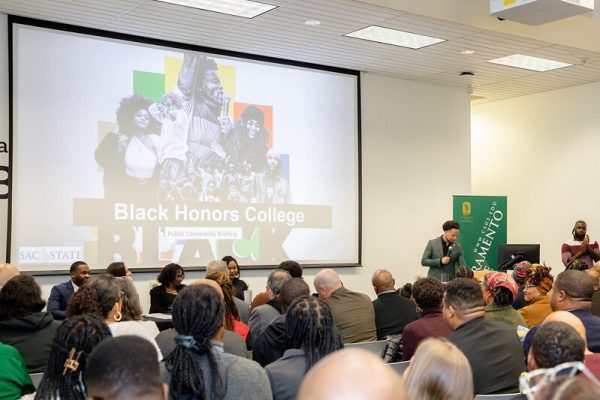With a nationwide decline in Black student enrollment and retention rates, the California State University system wants to support its Black student community with the new Black Student Success Task Force that will implement a first-in-the-nation Black Honors College only at Sacramento State.
The Black Student Success Task Force at Sac State will advance Black students on campus by focusing on recruitment, retention, achievement, graduation and issues with belonging.
With the addition of a Black Honors College, the success rates of Black graduates at Sac State will be refocused as they are given the specific space and resources to succeed.
Black Student Success Task Force
Sac State’s Vice President for Inclusive Excellence Mia Settles-Tidwell is the cabinet-level sponsor of the Black Success Initiative, which seeks to improve the future of Black scholars.
“We actually enroll the highest number of Black students in all the CSUs,” Settles-Tidwell said. “That means we are drawing and attracting Black students.”
CSU enrollment data shows that Sac State has approximately 2,000 Black students, the highest number of Black students across all CSU campuses.
The BSI is a part of the CSU-wide 2025 Graduation Initiative, which ensures all students have the chance to earn a college degree regardless of racial, ethnic and financial background.
Settles-Tidwell said that looking back, Black students weren’t always allowed to get an education, let alone a higher education.
“Historically, institutions were not designed around Black students,” Settles-Tidwell said. “It was illegal to learn how to read. When you finally fought to get the education and be included, you’re already behind in a system that was not educating you about their system too.”
Once Black students were able to attend school, they were immediately falling behind in the system, and the BSI works toward making up for past inequalities by providing a supportive educational community for Black Students in higher education.
Settles-Tidwell said the caring community on campus motivates students to enroll and the support from the task force encourages current students to finish their degrees.
RELATED: ‘The Black History Museum’: Instilling, knowledge, awareness and pride
Director of the Center for African Peace and Conflict Resolution Ernest Uwazie serves on the BSI Task Force as the Black faculty success co-chair, where he works to improve the experiences of Black faculty.
Uwazie said retaining Black faculty is important in creating a greater sense of belonging so that Black students can engage with professors who understand them.
“In my department, I’m currently the only tenured or tenure-track Black faculty,” Uwazie said.
Uwazie said educating faculty is also important and he hopes to introduce programs that expand understanding of the Black experience.

“The goal is to understand what it means to be Black,” Uwazie said. “What successful strategies, if you have a Black student in the classroom, to use to understand the circumstances of that Black student and be able to support them.”
Second-year civil engineering major Jasmine Williams said within her major, there are not many people of color.
“My major is predominantly white,” Williams said. “I still haven’t had a Black professor in my major, so it can be frustrating at times.”
Williams said Black student groups have limitations or requirements that discourage her, but the task force aims to shift this narrative by creating safe spaces without any requirements.
Tina Jordan of Sac State’s Peer and Academic Resource Center serves on the BSI Task Force as the Black student success co-chair, and like Uwazie, she also attested to the importance of a Black student’s sense of belonging.
“We have the largest population of Black students,” Jordan said. “However, some of them don’t stay because they don’t feel like they have a sense of belonging, specifically in the classroom.”
Jordan has always been an advocate for creating inclusive classrooms at Sac State because she remembers how she was treated as a Black student herself.
“It’s cold and indifferent sometimes,” Jordan said. “We want our students to have that sense of community, and we want our students to thrive and feel accepted.”
Black students often come to Jordan at the PARC, reporting mistreatment from their professors and Jordan hopes the task force will put an end to that.
“Some people think that discrimination is maybe something in a student’s mind, or, you know, something that we never tried to focus on as far as anti-racism,” Jordan said. “So now we’re really gonna do it. I feel hopeful, and I feel like I’m part of that hope.”
Sacramento State Black Honors College
The efforts of the Black Student Success Task Force will be furthered by Sac State’s Black Honors College, opening in the fall 2024 semester, which will play a major role in shifting the experience of Black scholars at Sac State and achieving the goals of the task force.
“The Black Honors College is designed around research, scholarship and service that’s centered on the Black experience, Black thought and philosophy within a higher education system that any student can apply for,” Settles-Tidwell said.
In his spring address, President Luke Wood said the Black Honors College will help bridge the gap in Black student success by securing its own special area on campus to provide individualized resources.
“We have set aside 6,000 square feet of space for them to have their own seminar room, their own office suite and their own student center,” Wood said during the address. “We are building an institution within the institution, which has never been done before.”

Students with a 3.5 Grade Point Average or higher are encouraged to sign up for the Black Honors College. Priority admission closes on March 1, but standard admission will be open from April 1 until June 1, with student aid available.
Martin Luther King Jr. Center Outreach Coordinator Elijah Martin said that the Black Honors College addresses the serious problem of low Black student graduation rate, one that currently sits at 17.4%, while the system-wide rate is 23%.
“African American students are not graduating at the best rates right now,” Martin said. “But our leadership is not going to sit here and just let that be. They’re going to bring in innovative solutions to help change that.”
Martin also said that students should take an interest in the Black Honors College because it demonstrates how committed Sac State is to helping their students of color succeed.
Settles-Tidwell said she is excited about the induction of the Black Honors College and what this new experience will bring to students navigating higher education.
“I am thrilled to be a witness to history in the making,” Settles-Tidwell said. “It is critical to put into practice counter storytelling and centering the scholarship and research of the Black diaspora that can only be facilitated through a Black Honors College.”





































































































































